John Elder Robison's Blog, page 18
March 3, 2011
John Elder Robison on Ingenious Minds
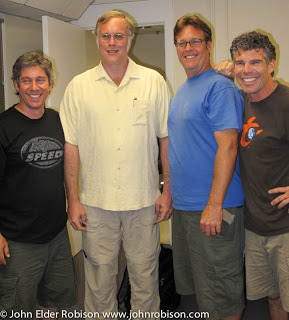
Me, with the camera and sound crew from Discovery Science, Ingenious Minds
The Science Channel show finally aired on Feb 24th. I think they did an excellent job; the production quality of the whole series has been vey high. One of my friends (Bob Jeffway) recorded the INGENIOUS MINDS show and uploaded it here in two parts
This is the first half
And this is the second half
I hope you enjoy it. Let me know what you think.(c) 2007-2010 John Elder Robison

February 18, 2011
Preview of my episode on Discovery Science and my tour schedule
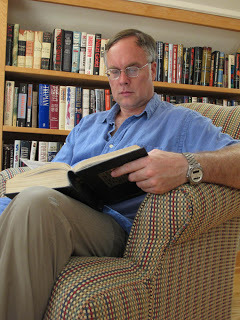
It's very weird seeing myself on television. Here's a link to the episode of Ingenious Minds that profiles me on Discovery Science next week. My friend Bob Jeffway talks about how I was . . .
Meanwhile, the release of Be Different draws closer every day. Here's a link to the wonderful trailer that Alex Plank made for the folks at Crown, Random House Canada, and Random House Australia.
I am about to embark on the most extensive speaking tour ever. It's exciting but also stressful and kind of scary. I'll be on the road for six week this March, April, and May, and again in September. I sure hope to see some of you at my stops on the road. Here's what I have so far, for 2011:
Remember my latest schedule is available at http://johnelderrobison.blogspot.com and on the www.johnrobison.com website
March 05, 2011, Lenox, MAI will be teaching my Asperger Mind course at the College Internship Program in Lee. This is a regular one-credit graduate course, which you can also audit or take for professional development credit. Register on the Elms College website; call the college or CIP for more details.
March 22, 2011, EVERYWHERE Be Different goes on sale! Order your copy now for delivery on the first day!
Mar 22, 2011, Atlanta, GA
I'll be appearing at ASA Georgia's 2011 conference at the Gwinnett Convention Center in Duluth, GA. Advance registration required . . . see conference website for details
Mar 23, Hartford, CT
I will be the keynote speaker for the Annual Professional Development Conference of the Connecticut Association of Private Special Education Facilities. This will be at the Connecticut Convention Center in Hartford, Connecticut. Registration required.
Mar 24, Washington, DC
I will be speaking at the National Institute for Children's Health. All NIH employees are welcome, but this is not a public event.
For more information or reservations, contact Alice Kau, Ph.D. at The Eunice Kennedy Shriver National Institute of Child Health and Human Development, Intellectual and Developmental Disabilities Branch, Center for Developmental Biology and Perinatal Medicine at 301 496 1383 or by email: [email protected]
Mar 27 (afternoon), 2011, Iselin, NJ
I'll be the keynote speaker for ASPEN's annual conference at the Hilton Woodbridge. For more information see ASPEN - Asperger Syndrome Education Network at www.aspennj.org All are welcome but registration is required and there is a fee to attend the conference
Mar 28 (evening), 2011 New York, NY
Join Michael John Carley and GRASP for an intimate evening fundraiser. Regiatration required; contact GRASP for details. Both Look Me in the Eye and Be Different will be available and I'll have time to speak to guests.
Mar 28, 2011 New York, NY
Join me at 7PM, at B&N Tribeca, 97 Warren St., New York, NY 10007. This free public event will include a Reading/Talk/Q&A/Signing.
Mar 31, 2011 Framingham, MA
Join me at Barnes & Noble on Route 9 in Framingham for a free event at 7PM
Saturday, April 2, 2011, 7:30 PM, Chicopee, MA
Join me at Elms College for a Q&A and discussion . . . This is a free event; Public welcome; Odyssey Bookstore will be there with books. I'll be in the Veritas Auditorium, 291 Springfield Street in Chicopee.
c. Kathryn James, Ph.D.
413-265-2282; [email protected]
413-265-2253 (admin asst.)
Sunday, April 3, 2011, Northampton, MA
Join me at 1:45PM at Stoddard Hall, Smith College for a Q&A and discussion . . . Public welcome; Broadside will be there with books
Events contact: Roxie Mack/Bill at Broadside
[email protected]
413-586-4235
Tuesday, April 5, 2011, Washington, DC
Join me at Ivymount School. Ivymount is home to the renowned Model Asperger Program for kids like me. They are producing one of the teaching guides for Be Different
I'll be speaking at a free public fundraiser at Ivymount School Auditorium, 11614 Seven Locks Rd in Rockville. Politics & Prose has Co-Sponsored the event with Ivymount. They will be there with books.
Wednesday, April 6, 2011, Houston, TX
Join me at 7PM at Barnes and Noble's River Oaks store for a talk and Q&A. I'll be there with folks from Monarch School. . . . Public welcome; Address is B&N River Oaks, 2030 W. Gray Street, Houston
Thursday, April 7, 2011, 6PM on Vermont radio, also streamed online
Join host Ann Barbano and I for THE NEXT FRONTIER, the first Vermont autism, disabilities and diagnosis radio program WOMM-LP 105.9 FM Burlington. Call in to (802) 861-WOMM (861-9666)
On ITUNES under eclectic radio WOMM
April 9, 2011, Nashville, TN
Join Dena Gassner and I at the Center for Understanding conference. 9AM to 2PM (several programs) at the Westminster Presbyterian Church, 3900 West End. Ave. in Nashville. Landmark will be there with books.
April 11, 2011, Toronto, ON
Join me at 7:00 PM at the Royal Ontario Museum where I'll talk about Being Different. Sponsored by Random House Canada and Autism Speaks Canada. Tickets required. I'll be signing copies of both books.
April 12, 2011, Philadelphia, PA
I'll be speaking at 11:45AM as part of a diversity and autism awareness program at The Kinney Center at Saint Joseph's University. Admission is free and open to the public.
April 13, 2011, Boulder, CO
I'll be visiting the Google Boulder crew and recording a talk for the Authors@Google program. This is a private event but you'll see it online shortly.
April 13, 2011, Boulder, CO
Join me at 7:30PM at Boulder Bookstore, 1107 Pearl Street.
April 14, 2011, Denver, CO
Join me at 7:30PM at Tattered Cover's Colfax store, 2526 East Colfax at Elizabeth Street
April 16, 2011, Burlington, MA
Join me at 2PM, Saturday afternoon for Educator Appreciation Weekend at the big Barnes and Noble store, 98 Middlesex Turnpike, across from the Burlington Mall. I'll be discussing Asperger's, autism, and education, while signing copies of Look Me in the Eye and Be Different. Free, open to the public, and refreshments are available in the cafe. Remember, Barnes and Noble sells all my books on the Nook as well as in print and CD audio.
April 19, 2011, San Francisco, CA
Join me at 7PM for a free public event at Books Inc.- Opera Plaza in San Francisco.
For more information, contact Margie Scott-Tucker 415-643-3400 x11 [email protected]
April 20, 2011, Portland,OR
Join me Wednesday at 7:30 at Powell's- 1005 W Burnside in downtown Portland
[email protected]
April 21, 2011, Seattle, WA
Join me at 7PM at Third Place Books, 17171 Bothell Way NE in Lake Forest Park, WA 98155
For more information contact Wendy Manning; 206-366-3316 or [email protected]
April 26, 2011, Madison, CT
Join me for a 7PM free public event at RJ Julia of Madison. I'll be signing copies of Look Me in the Eye and Be Different, and telling stories of life as a free-range Aspergian.
April 30, 2011, Dothan, AL
I will be speaking in my Uncle Bob's home town; at Wallace College, at the Spectrum Center for Autism
May 12-14, 2011, San Diego, CA
I will be attending IMFAR 2011 at the Manchester Grand Hyatt. Advance registration is required.
May 17, 2011 everywhere
My mother's memoir, The Long Journey Home, goes on sale. Join my mother and me at 7PM at the Odyssey Bookstore, Village Commons, South Hadley, MA for a discussion and signing.
May 18, 2011 Mass General Hospital, MA
Join me for a night at Mass General YouthCare. For this event I will be accompanied by Cubby and Alex, my own Aspergian youths.
May 26, 2011 Chicago, IL
I'll be giving the 1PM EBCALA legal issues keynote talk at Autism One, followed by a breakout session, book signing, and Q&A. Autism One and EBCALA Conference registration required.
Aug 25-Sept 15, 2011, Australia
Stay tuned for dates and locations. Check back here or with Random House Australia
Oct 11, 2011, Kent State, OH
I just agreed to join the Tuscarawas County Literacy Coalition for their annual One Book One Community event in Kent State University in Ohio. Save the date . . .
(c) 2007-2010 John Elder Robison

February 9, 2011
Autism and Fear
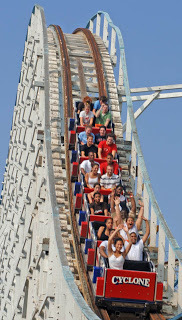
My friend and fellow autistic author Temple Grandin said something at last week's autism conference that really got me thinking. She said, The principal emotion experienced by autistic people is fear.
Temple went on to explain that fear is the foundation of many other feelings are built upon for autistic people . . . anxiety, rage, even depression.
If my life is a guide, she's right. In this essay, I'd like to ponder why that may be . . .
Last December, in The Meaning of a Smile, I wrote about my vulnerability to insincere people. Like many people with autism, I have difficulty discerning who is sincere and who's not. I can look at another person, and recognize their expressions, but I do not "share their feelings" the way nypicals (people without autism) do. Many scientists believe that problem is caused by a weakness in autistic people's mirror neurons. Whatever the cause, it's a profound element of disability that rears its head when you least expect it.
In my earlier story I wrote of the inability to distinguish the real from the fake when it comes to expressions. That makes it sound like I'd be an easy mark for emotional predators, and maybe I am. However, the larger problem is that my inability to "feel" another person when I look at them leads me to draw incorrect conclusions about their desires or intentions, to my occasional great detriment. The people I misjudge are not usually bad people, trying to do me harm. They're just people, going about their lives, and I get into trouble when I misread them during my dealings with them.
I project my own hopes or desires, even when they are totally at odds with what the other person is really thinking. I want something, I look at another person, and tell myself, They must want this too, even though their face is saying, No way! Sometimes the result is funny. Other times it's embarrassing, or hurtful, either to me or to them. Occasionally, it's harmful.
Autistic people often talk of being bullied and taken advantage of. I believe that emotional blindness is one of the main reasons that happens. In many cases, we bring the hurt upon ourselves through misinterpretation followed by misstep.
So where does that leave me? Like many others with autism, it leaves me fearful and anxious whenever I must deal with new people, or strange situations. I know this anxiety is shared by countless others on the spectrum. I hide it well, but the fear and anxiety is always with me.
Yet fear does not rule me. I am reasonably successful, on a number of fronts. How do I do it? I have thought hard about that, in hopes these tips will help others escape the weight of fear and anxiety.
First of all, I pay very close attention to the actions of other people. My weakness is in picking up nonverbal signals, whereas my hearing is totally unimpaired. Consequently, I have a natural predisposition to favor a person's words over their actions. However, the saying actions speak louder than words still holds true, and I have trained myself to pay close attention to the actions and compare the observation to the words. Any discrepancy between them, or between the actions and my goals or desires, is cause for concern.
Second, I have taught myself to ask the other person what they feel, and what they want, as often as possible. That won't protect me from intentional deception, but as I noted, most of my problems are the result of innocent misunderstanding, not intentional deceit.
By asking others what they want or feel, and also stating my own desires, I increase the chance that others will pick up on any misalignment between us and put it on the table for discussion.
Third, I have learned the wisdom of living in the moment, and relaxation through meditation. I can't do these things very well, but I observe others who do, and I see the benefit to that ability.
Fourth, I have learned to reflect before acting, and to engage in cardio exercise while reflecting. It seems like vigorous exercise slows or stops the internal dialogue in my mind, and allows me to approach emotional decisions with a clear and fresh mind. That, and the wisdom of time taken pondering, yields better decisions.
It's also likely that the increased heart rate and the associated increased flow of oxygenated blood to the brain, improves my mental acuity.
Finally, when all else fails, there is always anti-anxiety medication, or even antidepressants. I prefer to be drug free, but there are times when that fails, and I know there are people who would not be functional without the assistance of medications.
I present these thoughts as beneficial to autistic people, but for all I know, anyone might benefit from these same processes. After all, anyone who is not telepathic must be blind to the signals of others to some degree, and most of you are not telepaths.
This essay originally appeared at Psychology Today
(c) 2007-2010 John Elder Robison
January 29, 2011
Check out this illustrated audio clip from Be Different
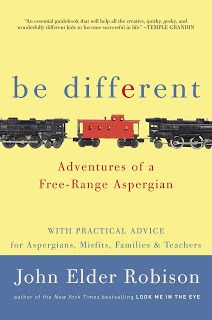
In my last post, I wrote about making the audio. In this post, you can follow this link and listen to the result.
For my last book, Random House made a widget that played a clip from the audio book. I always wanted images to go with the audio, though, and that's what we have done for Be Different. Alex Plank took the audio and 100+ images from my past and combined them to make a wonderful ten minute video.
There are pictures of me an my mom, when I was just a few days old. Me and my dad camping, and on my grandpa's tractor. At the Mulberry Tree Nursery School, with the kids you met in Look Me in the Eye. You'll see me with KISS, and on my motorcycle, at 18, and with Cubby when he was little. The images continue right up to the present day. It's a remarkable piece of work and I can't thank Alex enough for making it.
You can pre-order Be Different here. The link has hardcover, Kindle, and audio CD editions listed. An audio download link to Audible and iTunes will be put up soon.
I hope you like it.(c) 2007-2010 John Elder Robison

January 26, 2011
Creating the audio version of Be Different
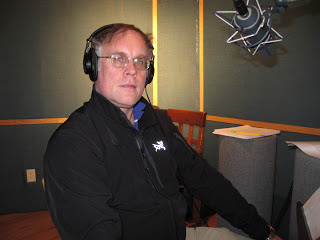
This is me, narrating the audio version of Be Different at Armadillo Audio in Amherst, MA. January, 2011
The dream of writing a book is very common. In today's world, though, not everyone reads with their eyes. A significant and growing portion of the population ingests their literature audibly, rather than visually. Fifty years ago, people like that got their thirst for literature satisfied by having someone who could see and speak read to them. Today, auditory readers buy audio books.
We have seen some major shifts in publishing this past decade. When I was younger, the only path to publication was through a conventional publishing house. You submitted work, got it accepted, edited it, and saw it appear in print some months or years after beginning the process. Today all that has changed. Anyone can write a book, and offer it for sale in downloadable form on Amazon and elsewhere.
Much the same thing has happened with audio books. Anyone can create an audio book, and offer it for free or for sale on Amazon or iTunes. But how do you do it? I'll show you . . .
The audio book begins with a script. In my case, as with other conventional print authors, the script is made from the print manuscript. That edited manuscript is read carefully and changed where appropriate for audio. Most changes are small. For example, in the print book you might say,
When you read this . . .
In the audio version, that becomes, When you hear this . . .
You also need what they call an intro and an outro, short passages to open and close the audio book. My intro goes something like this:
Be Different
Adventures of a Free Range Aspergian
Written and narrated by John Elder Robison
In a print book, the author is always identified, even though he may be writing under a psuedonym. In an audio book, it's customary to identify the narrator as well. Many people like to listen to audio books that are narrated by their authors. There's something to be said for hearing an author read his own words. Other people like hearing professional actors read stories; sometimes you find famous stars narrating some surprising works of audio.
Next I narrate the production and copyright; a few short lines:
A production of Random House Audio
Story copyright 2011 John Elder Robison
Production copyright 2011 Random House Audio
From there, we skip over the title pages and publication data that make up the first few pages of the print book. I read the dedication:
For Cubby, the very embodiment of Being Different.
I skip the contents, and go right to the first "story." In this book, that's the introduction. I begin reading:
Madison Square Garden, 1979. The New York concert was the high point of KISS's Dynasty tour, and we kicked it off with a bang and a flash. The band played loud enough to make your ears bleed, and our pyrotechnics would burn your eyebrows off if you got too close. We were five songs into the set. "Firehouse" had just ended. We killed the spotlights and got to work. Buzzes and clicks from the sound system suggested activity, up on the blackened stage. The applause was over, and low ripples of noise washed through the audience as they waited for the next song.
I do this reading at a professional sound studio, which is the best way to get a voice recording that's free of background noises and consistent in volume and sound quality. You can certainly record an audio book right in your bedroom, but the sound quality will probably suffer. If you are serious about audio, I suggest using a rear studio.
I'm lucky to have such a studio right in my town. Armadillo Audio is run by Peter Acker. He's been the engineer for the audio versions of both Look Me in the Eye and Be Different. He's done a fine job for me, and I'd recommend him without reservation if you want to record a book. You can find him here.
The engineer's job is to handle the technical details. He is responsible for listening carefully and making sure I am recorded at a consistent volume, and there are no untoward pops or hisses from my breath. He listens to make sure passing trains and planes are not audible in the background, and he turns the recording into digital files that are sent to the editors.
Sitting next to Peter in the control room is the director. Be Different was directed by Louis Milgrom, an award-winning director who drove up from New Jersey to record my story. His job is to make sure I read at the correct speed – not too slow, and not too fast. A rule of thumb is that a finished audio book will flow at about ten thousand words an hour. That is, a sixty-thousand-word book will be six hours long as an audio book.
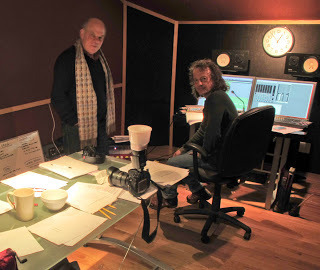
The director makes sure I pronounce words right, and also ensures that I follow the script. If I deviate from the script, he notes the changes and we make sure that's what we want to do. Here he is:

If I make a mistake, or if there's an unwanted noise, the director or engineer will stop me, and we'll start reading again. We also take breaks in reading the script; no one could sit in a chair and read in a constant voice for eight full hours.
For me, a sixty-thousand-word story takes two days to narrate in the studio. That's pretty normal.
It's great having two people fill these engineer and director roles, but for many lower budget productions the engineer also serves as the director. Peter has done that many times. Once the recording is done, we move to the next step – editing.
Random House uses a single company – John Marshall Sound – to edit all its audio books. The editor tosses out the mistakes and pauses, and chains all the different takes together into one continuous audio story. That process takes a day or two for most books. The editor may also add music to the beginning and the end, and he may make subtle alterations to the tone to get a better sound quality.
At that point, the audio is ready for sale. In my case, it goes back to Random House, where they package it with the cover art, and distribute it to all their audio marketing partners. In fact, you can pre-order it online now
You'll be able to see how my most recent effort turned out very soon. I'll have a clip from the audio book up next week, and the whole book will be available for download in less than two months.
It's coming fast . . .(c) 2007-2010 John Elder Robison

January 19, 2011
The making of Be Different - Pull Quotes
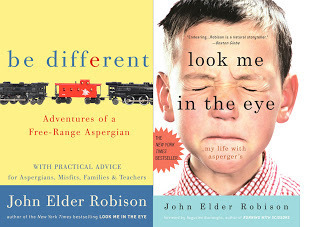
One of the stylistic things that separates Be Different from Look Me in the Eye is the use of what's called pull quotes. Pull quotes are passages the editors deemed significant. They copied the quotes in little boxes on the pages in which they appear.
Here are a few of the Be Different pull quotes . . . see if you can imagine their context . . .
It doesn't mean anything. I felt like I'd been punched in the gut.
p. 11
My differences turned out also to include gifts that set me apart.
p. 18
For me, failure wasn't permanent state of being.
p.22
Something that seems like a pure disability can actually have components of gift, too.
p. 23
Competence often excuses strange behavior, especially when you get older and have an established reputation.
p. 25
Find life and work settings that minimize your weaknesses, and find your strengths and play to them.
p. 26
I learned to accept the way other people do things even if I'm sure that they are wrong.
p. 28
Rituals become a problem whenever they prevent you from doing the stuff you're supposed to do, or when they get you in trouble.
p.35
For as long as I can remember, people have commented on my strange names for things. I maintain my names have a sound logical foundation…
p. 40
'Normal' often simply means 'well mannered.'
p. 43
Aspergians like me are notoriously logical and straightforward, and much of the time, manners are neither.
p. 45
I came to understand that I benefited from compliance with the social rules, even when they seem illogical, wasteful and nonsensical.
p. 46
I'm glad my family kept up the fight, trying to train me in manners even if it made no sense at all to me.
p. 46
Why bother? I bothered because I'd learned that having someone to love and cherish was the most important thing in the world
p. 59
After long and careful reflection I concluded that monsters may be real, and I was wise to be wary. Faced with a world of threats, what else is a tyke to do?
p. 63(c) 2007-2010 John Elder Robison

January 4, 2011
My beliefs about autism, research and more . . .

In a recent article on About.Com, Lisa Jo Rudy asks who, if anyone, should speak for the autism community. That raises the question . . . speak to whom? And for what goal?
Throughout history, when we read of "speaking for xxxxx," it's in reference to some oppressed or marginalized group, whose cause is advanced before a reluctant government or church.
For example:
Who speaks for the Arab population in Israel?
Who speaks for Gay soldiers in the Armed Forces?
Who speaks for migrant workers in California?
In almost every case, someone "speaks up" to obtain some semblance of wage or life equality for the oppressed group. I do not see myself as such a spokesperson. I'm not political, nor am I any kind of activist. That said, I am aware that I have a good many readers. So whatever you call my activity, I've got an opportunity to speak out for what I believe in.
So what do I believe in? I thought it might be appropriate to use this column to state some of my beliefs, which are always subject to change as my knowledge grows and I continue to evolve . . .
First of all, I recognize that the autism spectrum is very broad, encompassing verbal, commercially successful, eccentric geeks at one end and non-verbal, unemployed, disabled individuals at the other. There is a broad range of humanity between those two extremes, and their wants and needs are not only different, they are often mutually exclusive.
I believe some in the autism community waste a great deal of time arguing for or against the concept of cure. Let me state my position on "curing autism." While I think autism is a naturally occurring brain difference, and is not "curable" in the way an infection might be cured, I believe we should develop tools to remediate autistic disability. For example, I believe we should develop ways to help non-verbal people communicate. I also think we should try to develop therapies that will minimize the impact of (for example) genetic differences that lead to autistic disability in infants.
I am very much in favor of using science to make the lives of autistic people as full and satisfying as they can be. I don't call that a cure, but other people may use that word for the work it encompasses and I hope we can accept that idea without fighting over semantics.
At the same time, I am opposed to forcing any treatment or therapy on anyone against their will, and I am opposed to programs that lead to development of genetic tests for the purpose of abortion.
I believe all people deserve to be treated with respect, and I believe there is room in this world for many different points of view.
I think autistic people deserve the right to advocate for themselves, and make their own decisions with respect to therapy or treatment to help fit into society. That said, I understand that some autistic people cannot do this, and others need to look out for their interests.
I recognize there are many ethical dilemmas in the autism world, such as who needs a guardian and who doesn't, or what right parents should have to choose controversial treatments for their children. I don't have absolute answers to those questions but I'm willing to contribute to the dialogue.
I believe the medical community has a duty to search for ways to remediate the disabling aspects of autism, and I support their efforts to do that. I recognize some autistic people will embrace new therapies, while others will choose to live as they are. I believe we should respect both paths.
I think the causes and cures for autistic disability are going to be complex and hard to find. If there were easy answers, we'd have them already. I believe we need to put more money into research, while also finding family services and accommodations.
To that end, in addition to medical research, I believe psychologists and mental health professionals should develop new strategies to help autistic people succeed and be happy.
I believe employers should do more to accommodate autistic workers. Autistic people bring a unique set of skills to the workplace, along with unique challenges. I think much more can be done to help our autistic population find satisfying and meaningful employment.
At the same time, as an autistic person, I recognize that we need to learn to behave in ways that will be acceptable to the general public. Businesses should make reasonable efforts to accommodate us, but we need to take our own steps to fit into the workplace as best we can.
I believe in the power of early detection and intervention. Study after study has shown that autism's disability is minimized through early intervention. I support research into detection and intervention in toddlers and infants.
I believe schools can do more to develop programs for autistic kids. My Aspergian son and I are both high school dropouts, and I'd like to see that sort of thing come to an end.
I believe the scope of autism therapy and treatment covered by health insurance should be dramatically expanded.
I believe autistic people should have greater representation on the governing boards of organizations that purport to serve them. I believe this to be true in both the public and private sectors.
I believe in the value of mentoring, and the value of positive role models.
I welcome your comments and thoughts
(c) 2007-2010 John Elder Robison
December 21, 2010
Introducing the Autism Connects design challenge
So what, you ask, is a communication challenge?
In this contest, the term "communication challenges" is very broadly interpreted. A technology that helps Asperger people make friends can be considered, as can a device that helps nonverbal people talk. Tell us what challenge your device addresses, and how, and you're in.
Entries will be judges by a panel consisting of myself, Temple Grandin, Peter Gerhardt, Peter Munday, Andy Shih, Dan Feshbach, Richard Seymour, and others.
Visit the landing page for the site here
College students have been able to register for the competition for a few weeks now and we've had good interest with over 100 signing up. The competition site will officially go live on January 3rd for design students to begin uploading their ideas and to receive feedback from the autism liaison community we've been busy putting together (we have 100 volunteers who will act as liaisons to provide advice and guidance on the designs).
Here is an essay I wrote on communication, from the contest description:
Everyone with autism has some sort of communication impairment. The terms autism, Asperger's Syndrome, or PDD-NOS describe some of its different flavors. The various conditions that make up what we call the autism spectrum differ greatly in their impact upon us, but the one diagnostic feature they all have in common is communication impairment.
All autistic communication problems stem from brain dysfunction. Autistic people can see and hear just like anyone else, but our brains may not make sense of those inputs in the conventional way. The same is true for speaking or moving our bodies to convey messages. The physical parts are all there and working normally, but we have trouble using them in the expected way due to our neurological differences.
The most obvious autistic impairment is the inability to understand or deliver speech. In our society, if you can't understand what others are saying, you are going to be disabled. If you can't speak for yourself – whether through speech or writing – you are going to be disabled. If you can't do either, you are doubly disabled.
If you can't make sense of a phrase like "Bob will pick you up at five," how will you ever get home? The short answer is, you won't. An autistic person who cannot understand speech might be likened to someone who speaks English in a town filled with Chinese speakers, none of whom speak a single word of English.
However, there is an important difference between a native English speaker in China and an autistic person. The English speaker has all the wiring in his brain to converse. In a matter of days, he will be working out the meaning of simple Chinese phrases. The autistic person does not have a system for learning language. So he can't adapt. For autistic people with language trouble, understanding speech can take years. For some, it never happens.
Speech and language impairments are what we might call left-brain afflictions of autism. What about the people with right-brain issues? Those folks may understand the logical meaning of words just fine, but they cannot grasp the emotional undertone. That's always been my problem. I have no problem with logical meanings, but the unspoken subtext – so vital in expressing emotions – goes right over my head.
For example, when I hear, "That's just great!" I cannot tell if I'm hearing praise or sarcastic criticism. With no clue how to answer, I respond incorrectly much of the time. That's the silent communication disability in autism. People who can't speak are obviously disabled, and cry out for compassion. People with good command of language, but no sense of the unspoken undercurrents, are often perceived as obnoxious, arrogant, or disrespectful. Those negative reactions lead to depression, anxiety, and in extreme cases, suicide or violence.
Some people on the spectrum have a hard time expressing themselves because they are, for lack of a better word, clumsy. That may sound strange, but issues with coordination and fine motor skills can make it hard to form facial expressions or make gestures to convey a message. If you are really ungainly, your meaning may be lost in a dance of strange-looking movements, or rendered invisible with no movement at all.
Where's Bob? He's over there. Most of us take for granted the ability to swivel and point so that you are sure to recognize Bob. A person who can't do that effectively is handicapped just as surely as someone who cannot utter the words. Unfortunately, many individuals who have problems controlling their bodies also have trouble forming the spoken responses, so they are doubly impaired. Physical responses are an expected part of ordinary interchange; people who cannot do that tend to be ostracized, ignored, or subjected to ridicule.
People with traditional autism – also called Kanner's Autism – tend to have both verbal and physical challenges of varying severity. People with Asperger's Syndrome (like me) are more likely to have impairment in reading or conveying unspoken communications. Some of us have challenges in both areas.
We now recognize that early and aggressive intervention results in far better adult language skills. That's why we feel it's so important to identify and address autistic communication problems as early as possible. Technology plays a key role in both the identification and resolution of childhood communication issues.
For most young people, autism therapy ends when they leave high school. One-on-one therapy is costly; few people can afford it on their own. Adult health insurance is often limited in coverage. That's why we look to technology to help adults with communication issues. I hope to see the development of devices that assist adults with communication issues at all levels, from helping severely impaired people with basic communication to helping less impaired people interpret the subtlety of facial expressions or nuances of spoken meaning.(c) 2007-2010 John Elder Robison

December 14, 2010
The meaning of a smile
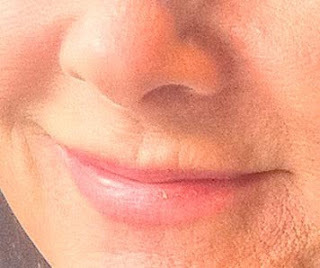
One of the biggest problems of Asperger people in love is that we can't tell a false "salesman" smile from a genuine nurturing smile. One smile is delivered for the benefit of the smiler; it's essentially predatory and self-serving. The second is delivered for us, the smilee. It's true, open, and giving.
However, without the mechanism for instinctively evaluating other people's facial expressions, we may use the wrong evaluation criteria. You see, the salesman is often loud and expressive in her expressions, where the true friend is much quieter and more reserved.
In the absence of working instinct, we may choose the salesman's louder signal as the better one simply because it gets through to us where the subtle signals (those that are really true) are totally missed.
The result can be disastrous, when it comes to romance.
When we respond positively to the salesman, we are in essence accepting her pitch. In commerce, the message might be:
Look at me, I smile and make you feel good, so you will buy your next home from me and I will get a big commission.
In love, the message might be:
Look at me, I smile and make you feel good so you will fall in love with me and buy me things and give me the life I know I deserve.
There is nothing for the recipient of the smile in either of those messages. In contrast, a true message, delivered in the realm of love might be:
Look at me, I smile because I love you and I want to make you happy. When you look happy, I feel good inside.
That message implies a strongly positive and essentially equal exchange for both parties. Laid out in that manner, no rational person would choose to be in the presence of salesman smiles when he could choose a true smile instead. Unfortunately, when people smile at us in real life their expressions do not come with honest interpretive guidebooks. We have to judge with the tools at hand, in our heads; heads which are all too often inadequate for the task.
How do you recognize the genuine smile; how do you tell the person who is true from the one who sees you as a resource to be used, enjoyed, and discarded?
The first tip is that real smiles are not this black and white. Everyone has a mix of salesman and true lover within them. Even the hardest hearted salesman will give a true smile every now and then. And the truest and most nurturing person in the world will still succumb to moments of greed. So it's a balance; we want to find a person who is mostly true.
So what do we look for?
In some cases, we can look for sudden and dramatic changes in the other person's indicated mood. A true person, when feeling a strong emotion, will not be able to change their feelings, or their display of feeling, suddenly.
A salesman or trained actor will display any emotion required, at the drop of a hat. That's a skill that comes from one of several sources: In the case of an actor, it results from years of careful practice. In the case of someone else it may indicate a narcissist, a sociopath, or someone who is simply totally superficial. Needless to say, none of those latter things are good attributes in a potential mate.
Therefore, the "trueness" of a person whose signals change suddenly and dramatically is open to question. Tread carefully if you see this.
Another clue comes from the smiler's other behavior. A true person will display a consistent positive attitude toward you whatever you do, within reason. A salesman, in contrast, will only like you as long as you are doing what she wants.
Ask yourself the question: Is she nice to me all the time, or only on her terms? If you suspect the latter, be wary.
Finally, you can look at the requests that accompany the smile. Are they self-serving, or altruistic?
Think of mom, who smiles and says, Smile for mommy . . . I get so happy when I see you smile! That's altruistic, and a fair exchange.
Now think of the salesman, who smiles and says: Please will you buy this refrigerator? The smiler's sole purpose is to sell a refrigerator and earn a commission. To the smiler, the recipient is nothing more than a source of money and a strong back to carry home his purchase.
Requests in love can be complex, but with careful observation, a pattern can often be seen.
Remember, there is always a balance. Some smiles will always be self-serving, even in the best of people. What we want to do is weed the totally or mostly self serving people out of our lives while keeping those that are true close.
Here are a few other thoughts:
True love, and the smile that goes with it, is not manipulative or controlling. True love is unconditional.
True love does not appear overnight, or after two dates, or even after a month. True love builds over time. A true person may not smile much in the beginning but smile more as feelings develop. A salesman smiles more in the beginning, and less later as your feelings develop because her purpose has been achieved and the smile is no longer needed.
True love, and the smile that goes with is, does not hurt. If a person smiles at you, and you wince inside, or wonder, what's next, be very, very careful.
I wish I could say, read these rules and avoid the pain I've been through. Unfortunately, life doesn't work that way. As a realist, the best I can hope for is that you'll feel the same hurts I have known, and read this story, and have a flash of insight that perhaps keeps you from being hurt the next time.
As my farmer friends say:
There are some men who read the manual.
There are a few more who learn by watching.
And then there are those who have to pee on the electric fence themselves.
Which kind are you?
(c) 2007-2010 John Elder Robison

December 1, 2010
Help me make a list of Autism/Asperger resources
What are some autism books that made a difference in your life? How about non autism books that are relevant, for example, books on body language or social skill?
Do you know any schools that do a great job with our kids? How about college programs?
How about programs for teachers; graduate training or continuing ed?
What about individual speakers, doctors, therapists or psychologists who made a difference?
And what about local Asperger or autism societies or organizations?
As always, thanks so much for your help.
John(c) 2007-2010 John Elder Robison




